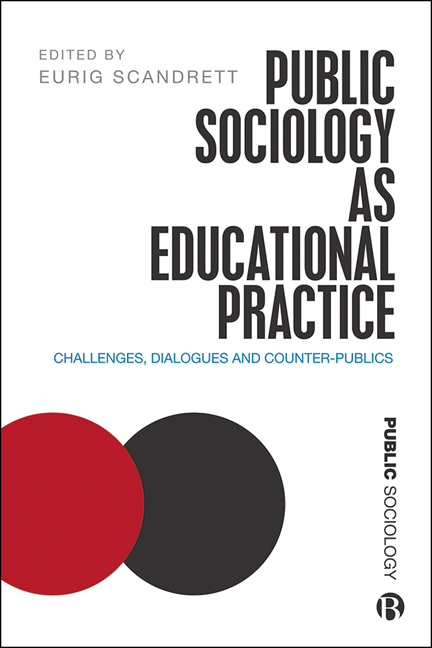I.0 - Provocation I: Class, Gender and Identity: Axes of Structure and Difference in Subaltern Counterpublics
Published online by Cambridge University Press: 02 March 2021
Summary
The section raises questions about the ‘who’ of public sociology education, and the inclusions, exclusions, and power relationships that inhere in definitions of ‘the public’. This provocation makes the case that public sociology primarily engages with subaltern counterpublics (Fraser, 1990) – those engaged in resistance, resilience, or building alternatives to some form of oppression, exploitation, or injustice.
In a key section of his address to the American Sociological Association, ‘Burawoy (2005: 7– 8) argues that there is a distinctive ‘organic public sociology’
in which the sociologist works in close connection with a visible, thick, active, local and often counterpublic. The bulk of public sociology is indeed of an organic kind – sociologists working with a labor movement, neighborhood associations, communities of faith, immigrant rights groups, human rights organizations. Between the organic public sociologist and a public is a dialogue, a process of mutual education. The recognition of public sociology must extend to the organic kind which often remains invisible, private, and is often considered to be apart from our professional lives. The project of such public sociologies is to make visible the invisible, to make the private public, to validate these organic connections as part of our sociological life. (Burawoy, 2005: 7– 8) (my emphasis)
This provocation attempts to take this argument further by claiming that public sociology primarily engages in this project of mutual education with subaltern counterpublics. Thus, the question of who and what constitutes a public, and with which publics sociologists engage, involves sociologically informed questions of power, structure, oppression and justice, and about the dynamics of resistance and emancipation.
Further questions arise as to what and who constitutes ‘the subaltern’ and what and how publics ‘counter’. Understandings of the subaltern emerge both from sociological analysis of structures of oppression, exploitation, and exclusion (whether or not such sociological analysis is done by ‘sociologists’) and also from collective self-expression and political demands for justice that emerge from subaltern groups. At the same time, what constitutes a ‘counter public’ (and in what ways they are ‘counter’) emerges, for the public sociologist, from dialogue with the praxis of those engaged in struggle against structures and representations that oppress, exploit and exclude.
- Type
- Chapter
- Information
- Public Sociology as Educational PracticeChallenges, Dialogues and Counter-Publics, pp. 13 - 24Publisher: Bristol University PressPrint publication year: 2020



